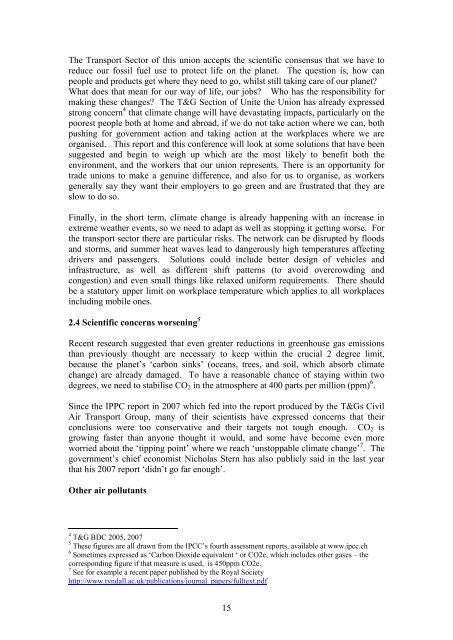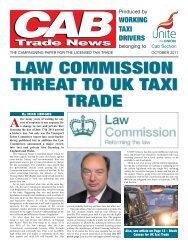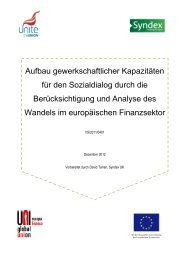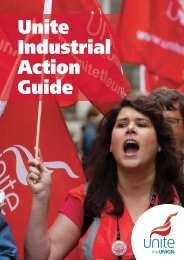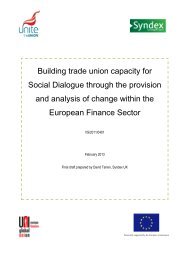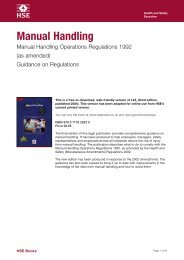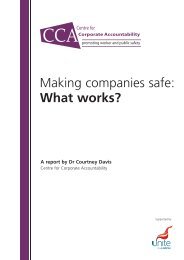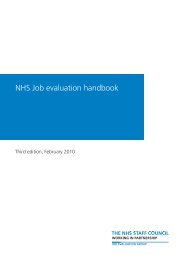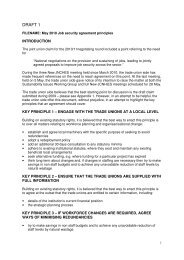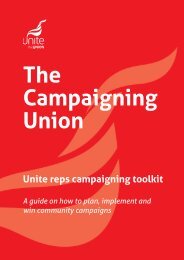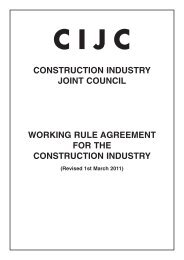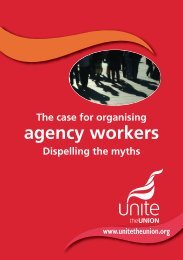Sustainable Transport and the Environment Guide - Unite the Union
Sustainable Transport and the Environment Guide - Unite the Union
Sustainable Transport and the Environment Guide - Unite the Union
You also want an ePaper? Increase the reach of your titles
YUMPU automatically turns print PDFs into web optimized ePapers that Google loves.
The <strong>Transport</strong> Sector of this union accepts <strong>the</strong> scientific consensus that we have to<br />
reduce our fossil fuel use to protect life on <strong>the</strong> planet. The question is, how can<br />
people <strong>and</strong> products get where <strong>the</strong>y need to go, whilst still taking care of our planet?<br />
What does that mean for our way of life, our jobs? Who has <strong>the</strong> responsibility for<br />
making <strong>the</strong>se changes? The T&G Section of <strong>Unite</strong> <strong>the</strong> <strong>Union</strong> has already expressed<br />
strong concern 4 that climate change will have devastating impacts, particularly on <strong>the</strong><br />
poorest people both at home <strong>and</strong> abroad, if we do not take action where we can, both<br />
pushing for government action <strong>and</strong> taking action at <strong>the</strong> workplaces where we are<br />
organised. This report <strong>and</strong> this conference will look at some solutions that have been<br />
suggested <strong>and</strong> begin to weigh up which are <strong>the</strong> most likely to benefit both <strong>the</strong><br />
environment, <strong>and</strong> <strong>the</strong> workers that our union represents. There is an opportunity for<br />
trade unions to make a genuine difference, <strong>and</strong> also for us to organise, as workers<br />
generally say <strong>the</strong>y want <strong>the</strong>ir employers to go green <strong>and</strong> are frustrated that <strong>the</strong>y are<br />
slow to do so.<br />
Finally, in <strong>the</strong> short term, climate change is already happening with an increase in<br />
extreme wea<strong>the</strong>r events, so we need to adapt as well as stopping it getting worse. For<br />
<strong>the</strong> transport sector <strong>the</strong>re are particular risks. The network can be disrupted by floods<br />
<strong>and</strong> storms, <strong>and</strong> summer heat waves lead to dangerously high temperatures affecting<br />
drivers <strong>and</strong> passengers. Solutions could include better design of vehicles <strong>and</strong><br />
infrastructure, as well as different shift patterns (to avoid overcrowding <strong>and</strong><br />
congestion) <strong>and</strong> even small things like relaxed uniform requirements. There should<br />
be a statutory upper limit on workplace temperature which applies to all workplaces<br />
including mobile ones.<br />
2.4 Scientific concerns worsening 5<br />
Recent research suggested that even greater reductions in greenhouse gas emissions<br />
than previously thought are necessary to keep within <strong>the</strong> crucial 2 degree limit,<br />
because <strong>the</strong> planet’s ‘carbon sinks’ (oceans, trees, <strong>and</strong> soil, which absorb climate<br />
change) are already damaged. To have a reasonable chance of staying within two<br />
degrees, we need to stabilise CO 2 in <strong>the</strong> atmosphere at 400 parts per million (ppm) 6 .<br />
Since <strong>the</strong> IPPC report in 2007 which fed into <strong>the</strong> report produced by <strong>the</strong> T&Gs Civil<br />
Air <strong>Transport</strong> Group, many of <strong>the</strong>ir scientists have expressed concerns that <strong>the</strong>ir<br />
conclusions were too conservative <strong>and</strong> <strong>the</strong>ir targets not tough enough. CO 2 is<br />
growing faster than anyone thought it would, <strong>and</strong> some have become even more<br />
worried about <strong>the</strong> ‘tipping point’ where we reach ‘unstoppable climate change’ 7 . The<br />
government’s chief economist Nicholas Stern has also publicly said in <strong>the</strong> last year<br />
that his 2007 report ‘didn’t go far enough’.<br />
O<strong>the</strong>r air pollutants<br />
4 T&G BDC 2005, 2007<br />
5 These figures are all drawn from <strong>the</strong> IPCC’s fourth assessment reports, available at www.ipcc.ch<br />
6 Sometimes expressed as ‘Carbon Dioxide equivalent ‘ or CO2e, which includes o<strong>the</strong>r gases – <strong>the</strong><br />
corresponding figure if that measure is used, is 450ppm CO2e.<br />
7 See for example a recent paper published by <strong>the</strong> Royal Society<br />
http://www.tyndall.ac.uk/publications/journal_papers/fulltext.pdf<br />
15


